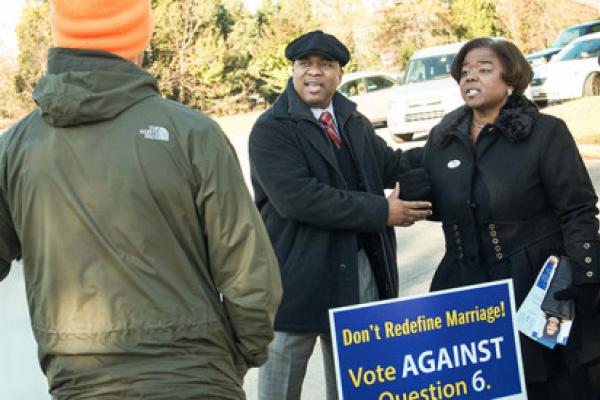Yoruba Richen’s documentary “The New Black” airs this month online and on television through the PBS series “Independent Lens.” The film, which explores the intersection of race, religion, and sexuality, also has been screened at Chicago’s Trinity United Church of Christ and New York’s Union Theological Seminary. An African-American lesbian, Richen talked to Religion News Service about the new openness she sees in black churches around the issue of same-sex marriage.
Q: How would you sum up the recent shifts you have seen in the black church over same-sex marriage?
A: What’s happening within the black church — and in the black community as a whole — is reflective of what’s happening in the country as a whole in terms of an opening to talking about sexuality and to supporting same-sex marriage. I think that new conversations are happening within the church. There are pockets that are open and are working on increasing acceptance of LGBT issues and people and then there are other pockets that are more resistant to it.
There’s still plenty of work that needs to be done within religious institutions but we’re seeing an opening and a conversation that we haven’t seen before.
Q: You have spoken of how the African-American community was blamed for passage of California’s Prop 8. Do you see the black religious community playing a role in the changes in opinion about same-sex marriage since that time?
A: I do. I think a few things happened: Barack Obama came out for same-sex marriage, which I think affected a lot of people’s willingness to be open to the idea of same-sex marriage. The NAACP came out after Barack Obama. Many black churches and leaders of black churches started to come out and support marriage equality, many of whom have a national presence.
A. Whether you call it a civil rights movement or a freedom struggle doesn’t really matter. It’s the quest for rights and for equality. Some people, like [National Black Justice Coalition Executive Director] Sharon Lettman-Hicks, who is in my film, will say it is a civil rights struggle. Other people will say it can’t be compared to the civil rights struggle.
Q: Are you confronting that issue directly with the “Freedom Summer Tour,” where your documentary is being shown as the 50th anniversary of that voting rights effort is marked?
A. We actually haven’t. When we tell people about the tour, there’s a complete understanding of the connection between the importance of the black vote, how we fought for freedom and equality, and the work continuing after it. It’s all a continuum. I think a lot of people get that.
Q: There are some groups, such as Many Voices, trying to increase dialogue about blacks and gays within the church. What difference are they making?
A: The more voices that you hear about this issue, the more people feel that they can come out and that they can be who they are and they can fight for justice and equality in their own community.
Q: Do you have a religious affiliation?
A: I’m not religious at all but, for the film, I thought the lens of the black church was important to understand because of the history of the civil rights movement as being based in the church and the repository of the movement. The black church has been a big influencer on our community.
Q: Has the fact that you are not a person of faith played a role in your activism on gay rights? Have you been upset about religious folks taking a stand that you didn’t agree with?
A: I’m a filmmaker, not an activist. This isn’t something that I’ve been active in in an “activist” way. From a personal standpoint, I am incensed when religion is used to take away or deny anybody rights.
Adelle M. Banks writes for Religion News Service. Via RNS.
Got something to say about what you're reading? We value your feedback!
